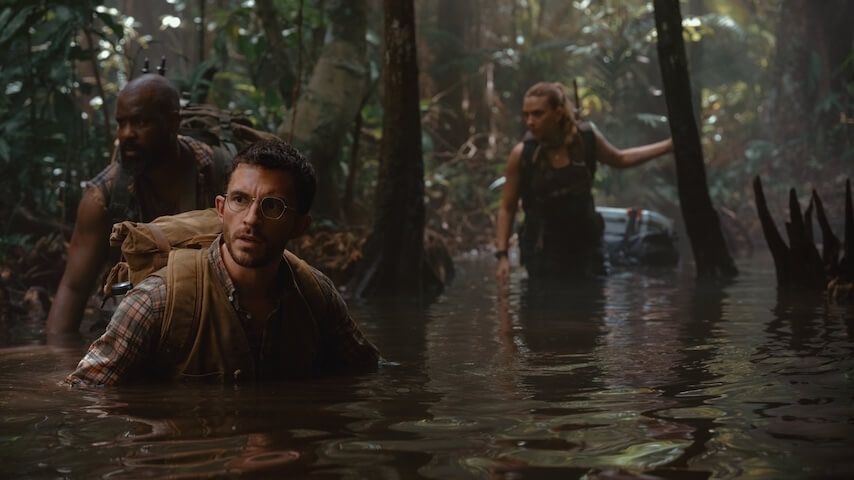The series of fetch quests undertaken by Zora and her cohorts (including the blank-slate paleontologist played by Jonathan Bailey) is funded by Big Pharma company ParkerGenix, whose representative (Rupert Friend) has them running the age-old Dennis Nedry scheme: smuggling dino bits off an island for cash. By taking blood samples from the biggest dinosaurs of land, air, and sea (Titanosaurus, Quetzalcoatlus, and Mosasaurus, respectively), ParkerGenix can isolate the secret to these beasts’ healthy, disease-free, sedan-sized hearts. The resulting drug could ostensibly wipe out human heart disease and make the company “trillions” of dollars.
But Bailey’s science guy has a do-gooder streak, or at least is the only person in this party who’s heard of universal healthcare. Every once in a while, he’ll take Zora aside and give her a well-intentioned but absolutely ridiculous pep talk: Why should a horrible pharmaceutical company be in charge of this incredible power? Why not make this DNA open source, available to any troll with an internet connection? It’s not like they just watched someone get torn apart by a hulking genetic freak whose God-affronting existence was conjured up by actual InGen scientists.
The usually cash-driven Zora, powerless in the face of this well-reasoned argument and the total lack of chemistry she shares with her nerdy companion, relents. This is especially easy for her since Friend’s character was not only hyper-capitalist slime, but also an attempted murderer who was recently killed right in front of everyone by the aforementioned Frankendino. As the surviving members of the team depart the island (which is not the island from any of the other films, but a worse, more sick and twisted island), she decides to give that DNA to everyone, to just toss it out into the digital ether and see what the world’s irresponsible tinkerers—or, considering cinema’s current love affair with AI, ChatGPT—can make from the source code for three of the biggest creatures to ever shake the earth. Big Pharma might then not control the fate (and price) of whatever medicine can be derived from this data, the only trade-off being that whatever illusion of control was still present in this franchise will evaporate into cyberspace.
This is clearly the direction a potential sequel will go. Hubris isn’t limited to folks in lab coats with advanced degrees. It, like this dinosaur biogoop, belongs to us all. The previous Jurassic World films showed how tough it is for boring “real” dinosaurs to survive in current environmental conditions. This entry gives the franchise a loophole. When Jurassic World Rebirth gets its inevitable follow-up, don’t be surprised by the number of DIY dino disasters stumbling around its increasingly unhinged world.

 Keep scrolling for more great stories.
Keep scrolling for more great stories.
